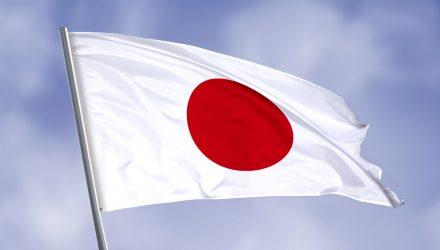Tuesday is widely expected to be the day the Bank of Japan ends its negative interest rate policy while ceding control of the country’s yield curve.
The central bank hasn’t confirmed those moves, but it hasn’t overtly denied them either. That’s prompted some market observers to speculate the yen is poised to strengthen. In theory, that could be a short-term negative for equities in export-heavy Japan. But on Monday, the WisdomTree Japan Hedged Equity ETF (DXJ) traded higher, extending its 2024 gains to almost 20%.
One day of trading isn’t something to get too excited or too anxious about. But DXJ rising in advance of potential interest rate increases is impressive when considering the ETF is a currency-hedged fund product. It could also signal optimism that Japan stocks, including DXJ holdings, can extend their bullish ways even if the yen appreciates.
Yen Still Undervalued
The yen is undervalued relative to the equivalent U.S. instrument, that being the dollar. That might imply the Japanese currency can endure some upside without acting as a headwind to stocks.
“Consensus is that the BoJ raising rates implies a stronger Yen. Indeed, the Yen is very cheap at two standard deviations below its 10-year average,” noted JP Morgan Asset Management. “However, the policy outlook is already reflected in futures market, with investors expecting the policy rate to hit 0.25% by the end of 2024 (from the current -0.1%). For the U.S. and Japan interest rate differential to narrow further and the Yen to strengthen meaningfully, the BoJ would need to be particularly hawkish or the Fed to be particularly dovish.”
As noted above, Japan is an export-centric economy. That means its companies doing business overseas can benefit from a weaker yen via higher earnings per share. Indeed, multinational firms of all stripes, regardless of home domicile, discuss the impact of currency fluctuations in quarterly earnings reports. However, DXJ investors might not need to fret about a stronger yen. That’s because the currency and Japanese stocks aren’t intimately correlated.
“The currency does impact those companies’ earnings, but it’s key to realize that the correlation between Japanese equities and the Yen has weakened substantially. From 2007-2019, the negative correlation between the Yen and the Nikkei 225 index was significant at -0.6 on average. This meant that when the Yen weakened, equities rose and vice versa. However, since 2021 this relationship has remained substantially weaker at -0.1,” concluded JPMorgan.
For more news, information, and analysis, visit the Modern Alpha Channel.








